“Gilead is within you” has been the rallying cry all season for The Handmaid’s Tale, and it has seemed to describe the Handmaids. The imagery is apt: something implanted without their consent, its growth within them beyond their control, until it eclipses any remaining sense of their former selves. But the real danger, as June, and Serena, have come to learn, is to Gilead’s next generation, born with this defect and destined to know nothing but this world.
Season 2 has been building pretty clearly to some form of internal revolt; the only question has been the who and the why. Eden’s transgression, and the monstrous way in which Gilead makes an example of her, fill in the latter blank. Is it any surprise, then, that this is what makes Serena and the other Wives finally step up?
Spoilers for The Handmaid’s Tale 2×13 “The Word”
I have to say that Eden’s death hits a personal narrative pet peeve in which a nonessential character is quickly introduced or shoehorned in so that their eventual death will have more meaning for the rest of the regular cast. It’s like when The 100 retconned the beloved character of Riley four seasons in, and this person who we had never heard of suddenly became a focal point around which every moral argument turned.
Rita somewhat lampshades this storytelling choice by mentioning how “I didn’t have a kind word for [Eden]” and “I treated her like shit.” June gets the first (but not the only) laugh of the episode by snarkily confessing that “I slept with her husband,” but Rita’s guilt is too great to find any humor in that: “I should’ve tried to help her.”
The thing is, none of this generation of women could have helped Eden. She was so indoctrinated in Gilead, so consumed by trying to understand her Bible and how it applies to the rules that shape her world, that the only people who could have helped her were the same Commanders who would punish her for reading, for daring to fall in love with someone other than the husband chosen for her. June’s discovery that Eden had heavily annotated her precious Bible, that she was trying to understand God Himself, brings a fascinating dimension to the character, unfortunately far too late in both the series narrative and from a storytelling standpoint. I would have loved to have seen more of Eden’s grappling with the word of God earlier in the season.
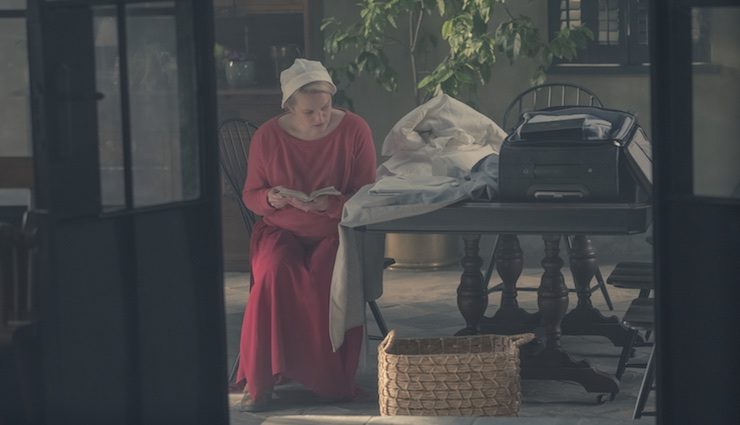
Another detail that is withheld until the last moment (though in this case to incite the proper amount of horror) is just how fervently Eden’s family believes in Gilead. Last week, I had raised the question of how quickly Eden and Isaac were apprehended. When Eden’s father comes to make his apologies for his daughter’s heretic ways, June learns the stunning fact that it was Eden’s parents who, when their own flesh and blood fled to their home, turned around and marched her back to the authorities.
“What are you gonna do when they come for your daughter?” June challenges Fred, but he doesn’t seem to worry about Nicole questioning Gilead in the same way that Eden did. This is the first of two excellent showdowns between Handmaid and Commander, but this one especially stuck in my mind for how truly scary, how vicious, June’s face looks as Fred is wrestling her to the couch with a hand gripping her chin. She’s not demure, she’s not negotiating—she looks feral, her entire expression twisted in utter hatred for Fred. He full-on punches her for her insolence, and you get the feeling that this is something he has wanted to do for some time. But she takes that like a pro, because finally neither is pretending at any camaraderie or connection.
Even if Eden’s death didn’t work for me personally, narrative-wise it’s enough to provoke actual empathy in Serena and the other Wives—a brief hushed conversation with frenemy Naomi Putnam reveals that the Wives have had their misgivings for some time. (Another great line: “Leah has opinions, no surprise there.”) Their proposal for an amendment isn’t even about upending Gilead, simply making it more understandable to both genders: to allow their sons and daughters to read Scripture, so that they may better perceive the reasoning behind the boundaries of their world.
The Wives striding into the Commanders’ private meeting was a rousing sight, bringing to mind the moments last season in which the Handmaids would come together for small moments of rebellion. It’s ironic—the architects of Gilead separate the women by different colored wardrobes, but they didn’t account for how striking it would look when members of the same tier came together in a sea of red, or blue. Strength in numbers. We are many, they are few.
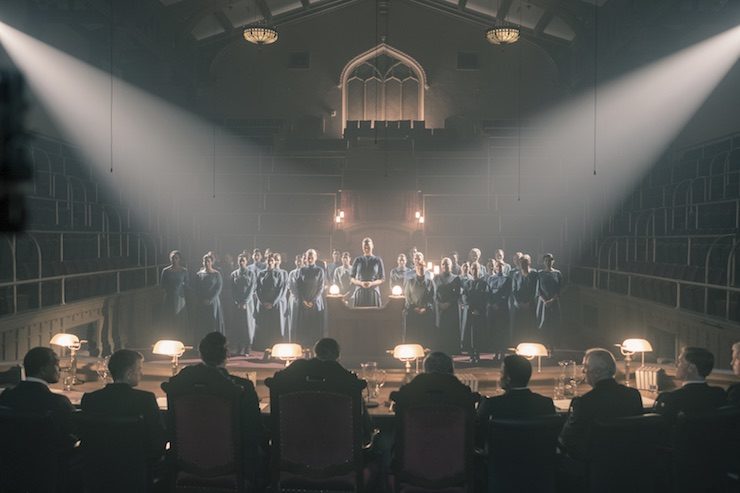
I almost believed it would work. Then Serena takes out the Bible.
While the initial shock of her reading “In the beginning was the Word, and the Word was with God” clearly sends ripples through the Commanders, unused to hearing a woman harness the sacred words, it ultimately weakens her argument. Some of the Wives, who clearly didn’t sign on for this, flutter away. And even though Serena gets to leave that meeting with her head held high, even though the Commanders play at privately considering her case, their solution is the same as always: drag her away where nobody can see, and mutilate her.
The Serena that Fred half-carries back to the house is in shock that her husband would allow the violation, the humiliation, of cutting off half her pinky. She is defeated, offering up to June a tremulous “I tried.” All things considered, she has expended so much less energy than any Handmaid, any Martha, any Econoperson. But regardless, it’s a brutal punishment that shows her how little Fred regards even her body, her well being.
He says as much to June, spitting his disdain for “all of you”—all women are beneath him. The castes are just to keep them from banding together.
With Serena brought low, Fred has the audacity to turn the charm back on with June—reminding her that “we all have our roles to play” and that “an obedient Handmaid might be able to stay in this house” with Nicole. But it’s when he goes to touch her, with his ludicrous offer that “we could try again, for a boy this time” that June finally snaps. “Go fuck yourself, Fred” was so incredibly satisfying to hear.
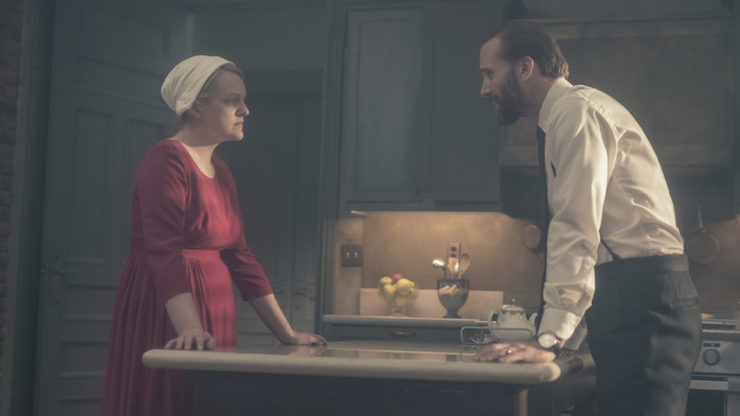
Speaking of roles to play, Emily faces down her first Ceremony in Commander Joseph’s house. Except that his wife stays hidden away, and he takes one look at Emily kneeling expectantly in the study and tells her that they don’t do that here. As a commenter pointed out last week, Joseph clearly has a much more nuanced relationship to his status as Commander than does Fred; while the latter endeavors to, and even delights in, obeying every law of Scripture to the letter, Joseph seems to have picked and chosen the aspects that he prefers and wholeheartedly rejects the others. Emily is so confused, so unsure of what is expected of her, that she palms the knife she has stolen from the kitchen and doesn’t attack Joseph as planned.
But the next morning, when Aunt Lydia comes to check in after the Ceremony—which Joseph said went splendidly—it is her condescension for the Handmaid that shows Emily exactly where she actually wants to put that knife. For all that this season has revealed little slivers of humanity for Lydia, especially the lengths to which she’ll go to ensure the security of Gilead’s babies, her regard for the women who birth those babies is closer to Fred’s than anything else. So, she gets a knife to the back, and a brutal push down the stairs, that has been 23 episodes in the making.
My initial response was disappointment, to a shocking extent, though after thinking about it, it was less that I was growing to like Lydia and more than Ann Dowd’s performance throughout this series has been just so spectacular. Her presence emphasized how truly scary the people are who prop up Gilead, and gave the series an eerie legitimacy.
After the first shock of Lydia’s death comes the next: Joseph doesn’t call the Eyes on Emily, but instead hurries her into his car for a ride to God-knows-where. This interlude, in which they race through the rain singing to “Walking on Broken Glass” while a hysterical Emily sobs, is one of the series’ most absurd, but I also loved it. It’s clearly building to something big.
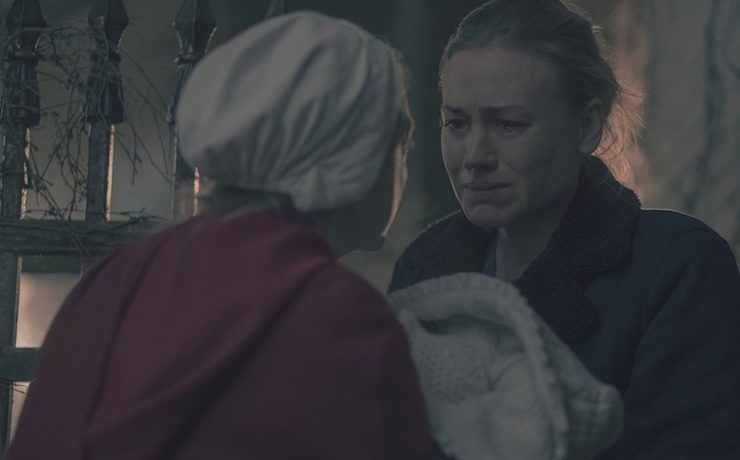
Back at the Waterford household, everything seems to be settling back into normal routines—until a firetruck sounds outside, and Rita rushes to June with the message that she can get her and Holly out. Now. So, it’s not the Handmaids who lead the resistance with their rejection of the rules that subjugate them; nor the Wives utilizing their privilege to change Gilead’s systems. It’s the Marthas: the domestic servants, the women of color, the background figures who keep households running and have set up their own network separate from the Underground Femaleroad.
But the final obstacle to escaping the Waterfords is Serena herself. Despite the Wife’s tendency to constantly dip back into her villainous ways all season, she and June have nonetheless carved out the tiniest bit of understanding between them, mostly centered on Holly/Nicole. Serena’s act of rebellion didn’t do anything to address the Wives’ fears for their children; she doesn’t know what else she can do to make a better future for her daughter. So when June tells her “I can get her out,” what can Serena say but yes? Even with how she’s treated June, her goodbye to Nicole was affecting.
And so, in a reflection of the first two episodes, the Marthas—who call June by her real name, a lovely touch—guide the Handmaid and baby from point to point. There appear to be a number of fires in the area, perhaps the work of Mayday or other sympathizers to keep the authorities distracted.
When June makes it to a dark tunnel, the end of the chain of Marthas, who is waiting for her but Emily and Joseph. Called it! Joseph remarks that he is “getting myself in deep shit” before wishing them well and driving away. It’s the perfect end to Bradley Whitford’s brief, bizarre arc: a man who built this world has come to regret his work, and does the small thing he can to atone.

But when the van comes to carry Emily and June to the border, June makes the decision she has been wrestling with all season: She hands baby Holly—into whose blanket she has tucked Hannah’s photo—to Emily, but she doesn’t get in the van with her. How can she flee Gilead with one child when she knows another is trapped within it? She almost made that decision months ago, pregnant and stowed away on an illicit plane. But while the plane was shot down and she was recaptured, now she chooses to stay.
Pulling on her cloak, her face suffused with that same darkness we saw before, June looks like an angel of death. Is she returning to Gilead to kill people, or to save them?
The Handmaid’s Tale season 2 has been full of starts and stops, which has made for jerky storytelling. The finale very much reflected the premiere, in which the momentum of rebellion abruptly reversed into another route, which worked more to unsettle than to build toward a stronger resolution. I’d like to see next season not retread those same paths and instead expand more into the outside world: Little America, Hawaii or other parts of the United States not subsumed into Gilead, or simply other perspectives like those of the Marthas, slowly chipping away at Gilead’s control. My big complaint about the finale was that it wasn’t Luke or Moira behind the wheel of that truck. That we didn’t see anything about where they stand after the Waterfords’ visit, after Nick’s revelations. I really hope that while June is cutting a swath through Gilead to find Hannah, that we see more of the journeys of her other loved ones.
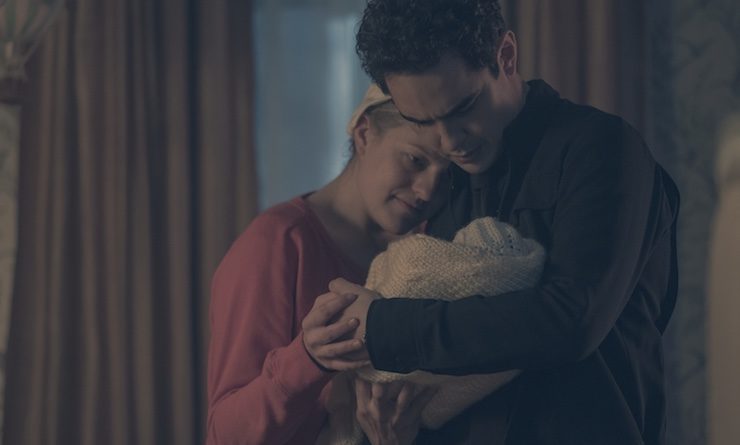
Scraps
- “Your girlfriend is a badass.” I loved the moments in which Rita, June, and occasionally Nick bond over their weird positions within the household.
- At least Nick got to hold Holly for a few moments before everything went mad. It’s also the first time June tells him she loves him. But what about Luke??
- When did June have time to scratch that into the wall?
- “Don’t do drugs!” Seriously, why can’t we get more of Commander Joseph? I hope he comes back next season, if only to confuse the other Commanders with non sequiturs when interrogated about his missing Handmaid.
- “All we leave behind is the uniform. […] Wife, Handmaid, Martha, mother, daughter, girlfriend, queen, bitch, criminal, sinner, heretic, prisoner.” I’ve said it before, and I’ll say it again: I really want to see more of women moving through castes next season. Maybe that’s the way that June infiltrates Gilead again, under another persona. She can’t come back as a Handmaid.
- What did you think of the finale? What do you want to see happen in season 3?
Natalie Zutter wrote most of this review listening to “Walking on Broken Glass” on repeat. Theorize about season 3 with her here or on Twitter!










